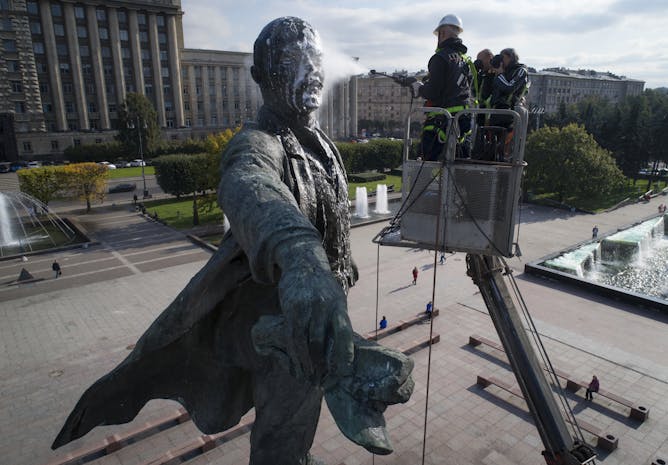Editor's note
|
|
If you want to project an image of a strong state, how do you honor the overturning of a seated government? Tomorrow marks the 100th anniversary of the Russian Revolution, but Vladimir Putin – whose grandfather cooked for Vladimir Lenin – has called the event “ambiguous.” Holy Cross’s Cynthia Hooper describes the delicate way the Kremlin is handling the centennial of one of history’s most momentous political events.
Following revelations that 126 million Americans may have seen Facebook posts created by Russian agents, philosopher and ethicist Gordon Hull asks: “Is Facebook bad for democracy?”
One solution to verifying online information could come from computer scientist Ricky Sethi who is developing a crowd-sourced truth-seeking system to help people evaluate pieces of evidence.
And, as hardly a day goes by without another revelation of a powerful man having sexually harassed co-workers, Wayne State law professor Peter Henning argues it’s time for the government to stop treating secret settlements for sexual misconduct as tax-deductible business expenses.
|
Nick Lehr
Arts + Culture Editor
|

|
|
Top stories
|

A worker cleans a statue of Vladimir Lenin in St. Petersburg. But how much Russian history gets whitewashed today?
Dmitri Lovetsky/AP Photo
Cynthia Hooper, College of the Holy Cross
Because the Kremlin hopes to project strength and unity, history isn't used as much to inform as it is to inspire, with events cherry-picked to fit within a fuzzy framework of 'Russian greatness.'
|

Voodoo doll or an illustration of the Republican tax plan on income inequality?
Rainer Fuhrmann/Shutterstock.com
Christian Weller, University of Massachusetts Boston
Supply-side economics is the intellectual backbone of the argument that tax cuts for the wealthy will boost business investment, wages and growth. The evidence suggests otherwise.
|

The secret settlements that leave the reputations of alleged sexual abuse perpetrators intact are also tax-deductible.
Lisa S./Shutterstock.com
Peter J. Henning, Wayne State University
Secret payments in exchange for silence regarding work-related sexual abuse are usually tax-deductible. How about changing that?
|
|
|
Environment + Energy
|
-
Michael E. Webber, University of Texas at Austin; Sheril Kirshenbaum, Michigan State University
With better access to energy, women in developing nations could spend more time working or in school. But Energy Secretary Rick Perry's claim that fossil fuels improve women's lives misses the mark.
-
Albert Simeoni, Worcester Polytechnic Institute
Many countries around the world are vulnerable to wildfires, but a fire engineer warns that most are not spending enough on research into how fires spread and ways to reduce risks.
|
|
|
|
|
|
|
|
Health + Medicine
|
-
Hoehun Ha, Auburn University at Montgomery
Several studies suggest that suicide rates in the US vary along geographic patterns.
-
Jay Desai, University of Southern California
The opening session of a meeting of neurologists focused on a problem plaguing doctors: burnout. Doctors are growing increasingly stressed, and it's affecting patients, too.
|
|
Trending on site
|
-
Rachel Caufield, Drake University
Former Trump associates face charges including conspiracy to launder money, failure to register as a foreign agent and lying to the FBI. A law professor explains what it means and what happens next.
-
Arash Javanbakht, Wayne State University; Linda Saab, Wayne State University
We may pretend that we do not like fear, but Halloween proves otherwise. Many of us enjoy being scared. But why?
-
Jean Twenge, San Diego State University
Move over millennials, there's a new generation in town. Dubbed 'iGen,' they differ from their predecessors on a range of measures, from mental health to time spent with friends.
|
|
Today’s chart
|
-

 Hoehun Ha
Auburn University at Montgomery
Hoehun Ha
Auburn University at Montgomery
| |
| |
| |
|
|